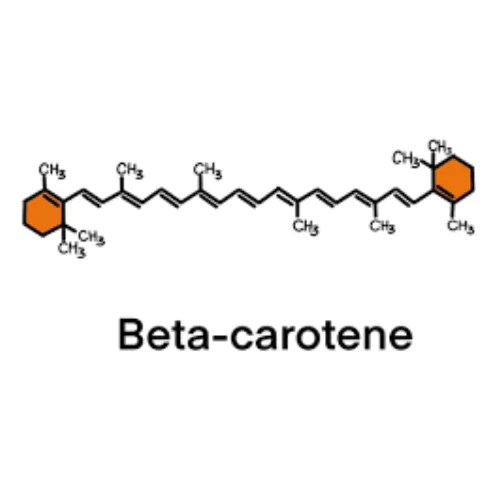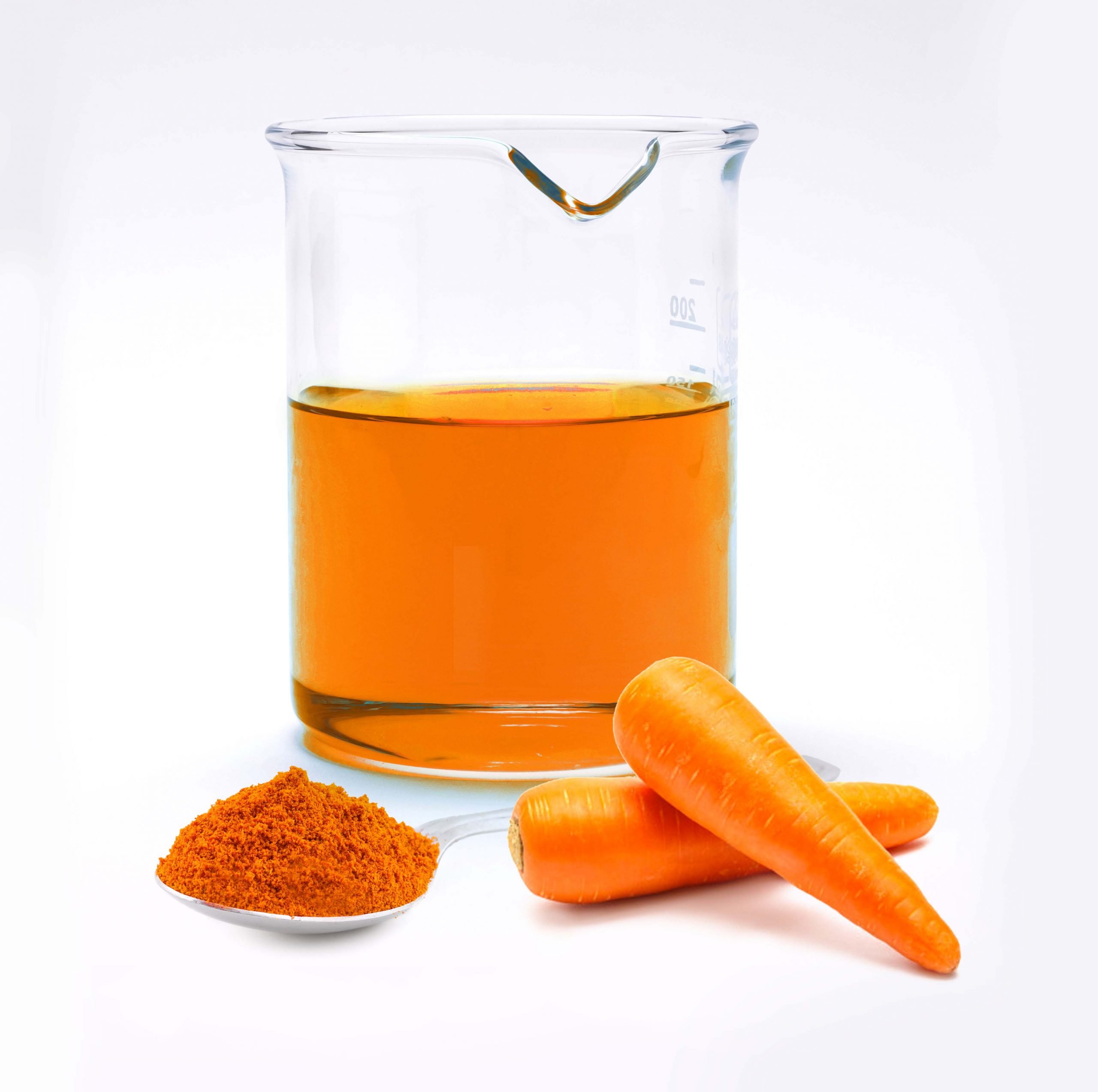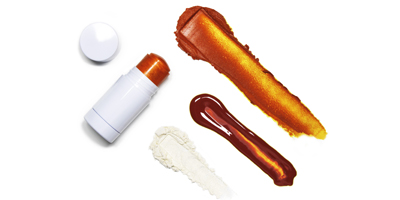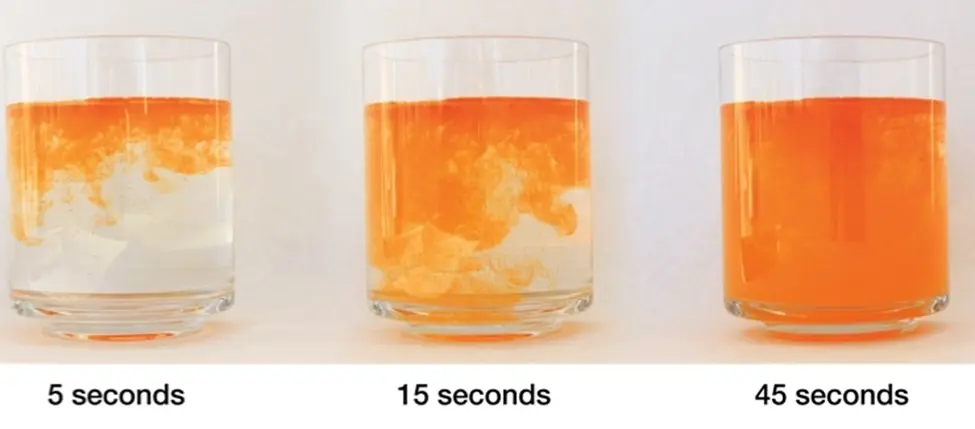What is beta-carotene for coloring?
β-carotene is an internationally recognized excellent food and feed additive that has both coloring and nutritional supplementation. It is widely found in animals, plants, and microorganisms, and together with other pigments, it makes these organisms present a variety of colors. Consumers are naturally drawn to vibrant, appealing shades in foods and beverages, while industries strive to use safe, sustainable, and health-friendly pigments. One such natural pigment that has gained widespread use is beta-carotene, a carotenoid compound best known for its brilliant orange to yellow hues. But beyond just providing color, beta-carotene also delivers nutritional and antioxidant benefits, making it one of the most versatile natural coloring agents available today.
In this article, we’ll take a deep dive into what beta-carotene for coloring is, how it works, where it is applied, and why it is preferred over synthetic alternatives.
What is Beta-Carotene?
Beta-carotene is a carotenoid pigment found abundantly in carrots, sweet potatoes, pumpkins, spinach, kale, and other deeply colored fruits and vegetables. It is classified as a provitamin A compound, meaning the human body can convert it into vitamin A (retinol) as needed.
Chemically, beta-carotene is a fat-soluble compound with strong antioxidant properties. Its vibrant red-orange color makes it a popular choice as a natural food coloring. Unlike artificial dyes, which may raise health concerns, beta-carotene is considered safe, natural, and even beneficial for health.
When extracted and processed, beta-carotene can be transformed into powders, liquids, or oil-dispersible formulations for industrial use in coloring foods, beverages, cosmetics, and supplements.
Types of Beta-Carotene
Beta-Carotene colors are available in different forms:
Water-soluble liquid
Water-soluble powder
Oil-soluble liquid


Why Use Beta-Carotene for Coloring?
Colorants are used to improve visual appeal, ensure product uniformity, and convey flavor expectations (e.g., orange color in orange juice). Beta-carotene stands out among natural pigments for several reasons:
Vibrant Natural Hue
Produces shades ranging from yellow to orange to reddish tones, depending on concentration and formulation.
Health Benefits
Functions not only as a pigment but also as a source of vitamin A and a potent antioxidant, supporting eye health, immunity, and skin protection.
Stability
Compared to other natural pigments, beta-carotene is relatively stable to light, heat, and oxygen, especially when microencapsulated or formulated properly.
Clean-Label Ingredient
With rising demand for natural and plant-based ingredients, beta-carotene is perceived as a safer alternative to synthetic dyes like Tartrazine (Yellow 5) or Sunset Yellow (Yellow 6).
Regulatory Approval
Approved globally as a safe coloring additive (E160a in the EU, GRAS status in the U.S.).

Applications of Beta-Carotene as a Natural Coloring Agent
Beta-carotene is used across multiple industries where natural coloring and added health benefits are desired.
1. Food Industry
Beverages: Used to impart a golden to orange tint in fruit juices, smoothies, soft drinks, and sports beverages.
Dairy Products: Added to margarine, cheese, and butter to provide a rich yellow hue.
Confectionery: Brightens candies, gummies, and desserts.
Bakery Products: Enhances cakes, pastries, and bread spreads.
Sauces & Dressings: Adds warmth and vibrancy.

2. Cosmetics Industry
Used as a natural colorant in lipsticks, foundations, and creams.
Incorporated into skincare products for its antioxidant and anti-aging properties.

3. Pharmaceuticals & Nutraceuticals
Capsule shells often use beta-carotene pigments for distinct coloring.
Supplements combine its coloring with nutritional benefits as a vitamin A source.
4. Animal Feed
Added to poultry feed to enhance the yellow color of egg yolks and broiler skin.
Improves nutritional quality for livestock.

Forms of Beta-Carotene for Coloring
Beta-carotene can be supplied in different forms depending on the application:
Powdered Form
Best for dry blends, baked goods, and powdered supplements.
Oil-Soluble Form
Ideal for margarines, dressings, and fat-based foods.
Water-Dispersible Form
Suitable for beverages, dairy, and liquid formulations.
Microencapsulated Beta-Carotene
Improves stability and shelf-life by protecting the pigment from oxidation.
|
SPECIFICATION |
|
|
Beta Carotene Crystals |
96% |
|
Beta Carotene CWS/CWD |
20% |
|
Beta Carotene OS |
30% |
|
Beta Carotene BD |
10%, 20% |

Advantages of Beta-Carotene Over Synthetic Colors
Natural Origin: Extracted from plants and algae rather than petroleum sources.
Nutritional Value: Provides provitamin A and antioxidant activity.
Consumer Preference: Clean-label trend favors natural, recognizable ingredients.
Safety Profile: No links to hyperactivity or allergic reactions, unlike some artificial dyes.

Conclusion
Beta carotene is a natural, safe, and multifunctional pigment derived from plants, valued for its bright hues and health-promoting properties. Beyond its role as a natural coloring agent in foods, beverages, cosmetics, pharmaceuticals, and animal feed, it also doubles as a nutritional enhancer, delivering vitamin A activity and antioxidant protection.
As consumers worldwide shift toward health-conscious and clean-label products, beta-carotene continues to gain importance as one of the best natural alternatives to synthetic dyes.
You can bulk beta carotene powder at YANGGEBIOTECH company is an industry-leading manufacturer and distributor for pure dietary supplements. yanggebiotech.com is not just a consumer brand. It also supplies pure ingredients to other brands that distribute food and other supplement products. Contact yanggebiotech.com to place an order today.


